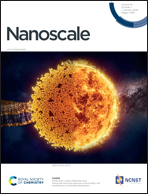Manipulating macrophage polarization with nanoparticles to control metastatic behavior in heterotypic breast cancer micro-tissues via exosome signaling†
Abstract
This study aimed to investigate the effects of nanoparticles on macrophage polarization and their subsequent influence on post-tumorigenic behavior. Initially, seven different nanoparticles were applied to macrophages, and Zn–Ni–FeO (100 nm) and palladium nanoparticles (PdNPs, ∼25 nm) were found to induce M1-polarization in macrophages. A co-culture experiment was then conducted to examine the effects of macrophages on MCF-7 breast cancer micro-tissues. The M2-macrophages promoted tumor proliferation, while M1- and PdNPs-induced macrophages showed anti-tumor effects by suppressing cell proliferation. To reveal the mechanisms of effect, exosomes isolated from M1 (M1-Exo), M0 (M0-Exo), M2 (M2-Exo), and PdNPs-induced (PdNPs-Exo) macrophages were applied to the heterotypic tumor micro-tissues including MCF-7, human umbilical vein endothelial cells (HUVECs), and primary human dermal fibroblasts (phDFs). M2-Exo was seen to promote the migration of cancer cells and induce epithelial–mesenchymal transition (EMT), while M1-Exo suppressed these behaviors. PdNPs-Exo was effective in suppressing the aggressive nature of breast cancer cells similar to M1-Exo, moreover, the efficacy of 5-fluorouracil (5-FU) was increased in combination with PdNPs-Exo in both MCF-7 and heterotypic micro-tissues. In conclusion, PdNPs-Exo has potential anti-tumor effects, can be used as a combination therapy to enhance the efficacy of anti-cancer drugs, as well as innovative implants for breast cancer treatment.



 Please wait while we load your content...
Please wait while we load your content...